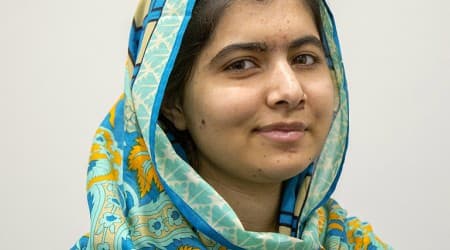Malala Yousafzai is a Pakistani social activist and the world’s youngest recipient of the Nobel Prize. Born in the Khyber Pakhtunkhwa province of Pakistan, Malala was inspired as a child by her father’s humanitarian deeds and philosophy. When she was in 7th grade, Malala started writing a blog, using a pseudonym, for the global broadcasting giant BBC, describing life under the Talibani militant occupation of her hometown and the surrounding Swat valley. Subsequently, The New York Times picked up on the story and made a documentary about her life. The documentary put her in the spotlight as the media started to cover her as a voice of peace and reason. In October 2012, as she was returning home in a school bus, Malala and 2 other girls were shot at by a Talibani militant. The assassination attempt was, supposedly, retaliation against her activism. Malala was hit in the head and remained in critical condition for a while.
As her condition gradually improved, she was transferred to the UK for further medical care. This dastardly attack on a teenager sparked international outrage against militancy in the region. Malala received an overwhelming outpouring of support from numerous governments, human rights organizations, and feminist groups. After recovering from her critical injuries, Malala became a vocal activist for the right to education, especially for girls. She based herself in the city of Birmingham and founded the Malala Fund, a non-profit organization that aims to help every girl under the age of 12, receive a formal education. Her advocacy has found several backers around the world and her slogan ‘books, not bullets’ has turned the idea of ‘education for all’ into a global movement. In 2017, She became the youngest ever United Nations ‘Messenger of Peace’.
Sun Sign
Cancer
Residence
Birmingham, England, United Kingdom
Nationality
Manager
She is represented by United Talent Agency (UTA), Beverly Hills, California, United States.
Sexual Orientation
Straight
Distinctive Features
- Always wears a headscarf
- Measured, but an impactful public speaker
- Genial smile
- Sharp, piercing eyes
Best Known For
Her social activism, especially in the field of education, for young and underprivileged girls
First TV Show
Malala made her TV show debut as “Herself” on the talk show Markus Lanz on October 8, 2013.
Malala Yousafzai Favorite Things
- Subjects – Philosophy, History
- Cricketers – ,
- Sportsperson –
- Sport – Cricket
- Dish – Chicken curry with rice
- Comfort Food – Pizza, French Fries
- Singer –
- Movies – Dilwale Dulhania Le Jayenge (1995), Inside Out (2015), Bajrangi Bhaijaan (2015), and Piku (2015)
- Actor –
- TV Show – The Big Bang Theory (2007-2019)
- Color – Purple
- Books – The Alchemist (1988) by Paulo Coelho, The Breadwinner (2000) by Deborah Ellis, A Thousand Splendid Suns by Khaled Hosseini (2007), and Stolen Girls (2017) by Wolfgang Bauer
- Article Of Clothing – Shawls
- Travel Destination – Dubai
Source – , , News24, , BooksOnTape.com,
Malala Yousafzai Facts
- As Malala’s family did not have enough funds for hospital delivery, her birth took place at home with the help of local midwives. She was named after Malalai of Maiwand, a famous warrior-poet from Afghanistan. Malala means ‘grief-stricken’.
- Her father always treated her as someone with special talents and used to encourage her to become a politician. She cites Pakistani politicians like Muhammad Ali Jinnah and Benazir Bhutto as her inspirations.
- At the age of just 11, in 2008, she spoke about education rights when her father took her to speak at the Peshawar press club. A year later, she joined the Institute for War and Peace Reporting’s ‘Open Minds Pakistan’ youth program, intending to help youngsters engage in social issues through journalism, debate, and dialogue.
- In early 2009, Malala started writing a blog for BBC Urdu, highlighting the brutality of militants who had taken over Swat valley. To ensure her safety, her blog was published under the pseudonym Gul Makai (which means cornflower).
- In her blogs, she also criticized the Pakistani military establishment for their lackadaisical approach towards controlling the Talibani militants.
- After her stint with BBC ended, her father approached the New York Times to make a documentary on the region’s plight. However, once it was released, Malala’s anonymity was also lost and her family started receiving regular death threats from the militants.
- In 2011, Malala became the inaugural recipient of Pakistan’s “National Youth Peace Prize”. Pakistan’s Prime Minister ordered the setting up of an IT campus in the Swat Degree College for Women at her request and a school was also renamed in her honor.
- In October 2011, she was nominated for the “International Children’s Peace Prize” by renowned South African activist, Archbishop Desmond Tutu. She did not win that year but was awarded in 2013.
- As Malala’s popularity rose, the threats to her life started to increase exponentially. The Taliban published death threats against her in newspapers and on her Facebook page. On October 9, 2012, a Taliban gunman shot her in the head, critically injuring her.
- Malala was airlifted to a military hospital in Peshawar, where she was operated upon. Once she was stable, she was moved to Birmingham for further rehab at the Queen Elizabeth Hospital. After recovering, she made Birmingham her permanent residence.
- The assassination attempt on Malala sparked protests in several Pakistani cities. More than 2 million people signed the Right to Education campaign’s petition, which led to the ratification of the first-ever Right to Education Bill in Pakistan.
- After the attack on Malala, American singer dedicated her song Human Nature to her at a concert in Los Angeles and also had a temporary Malala tattoo on her back. American actress also donated USD 200K to the Malala Fund.
- On October 15, 2012, UN’s Special Envoy Gordon Brown launched a petition in her name, using the slogan ‘I am Malala’. The petition demanded that no child should be left out of school by 2015 in Pakistan.
- In 2013, she co-authored an autobiographical book titled I Am Malala, which became an international bestseller. The same year, she was honored with the “Ambassador of Conscience” award by Amnesty International.
- On July 12, 2013, her 16th birthday, Malala addressed the United Nations and called for worldwide access to education. The UN marked the event as “Malala Day.”
- Excerpts from her “Malala Day” speech were used as lyrics for the song Speak Out, which was broadcast on International Women’s Day in 2017.
- Time magazine honored her by naming her in its annual list of “100 Most Influential People” for 3 successive years – 2013, 2014 and 2015.
- In 2014, at the age of 17, she was the co-recipient of the “Nobel Peace Prize”, making her the youngest-ever Nobel laureate and the 2nd Pakistani to ever win a Nobel. The same year, she stated that she aimed to return to Pakistan after completing her education and run for the prime ministerial post. However, by 2018, she had dropped that idea, deciding to stay focused on activism.
- The Asteroid 316201 was renamed after Malala in 2015.
- On her 18th birthday in 2015, she launched a school in the Bekaa Valley, Lebanon, for Syrian refugee girls. It was set up by her organization, Malala Fund. The same year, a documentary titled He Named Me Malala was shortlisted for the Academy Awards.
- In 2017, she was given honorary citizenship of Canada and became the youngest person to address the country’s House of Commons.
- Ironically, perceptions about Malala are mostly negative in her native Pakistan. Her opposition to the Taliban implies that militancy in Pakistan is not a direct result of interference by Western powers. This is in direct contradiction with the government’s statements on various world forums. Consequently, conservatives and Islamic fundamentalists often label her as ‘anti-Pakistan’ and ‘anti-Islam’.
- In 2015, the All Pakistan Private Schools Federation (APPSF) banned her book I Am Malala in schools across Pakistan, accusing her of being a ‘double agent’ and a ‘traitor’; as her activism had put the Pakistani armed forces establishment under global pressure.
- In March 2018, Malala returned to her hometown in Pakistan for the first time since the assassination attempt on her. The APPSF, in protest, organized ‘I am Not Malala’ Day.
- In September 2018, Malala published another book titled We Are Displaced: True Stories of Refugee Lives.
- Visit her official website @ malala.org.
Featured Image by DFID – UK Department for International Development / / CC BY-2.0
Facts of Malala Yousafzai
- Gender Female
- full nameMalala Yousafzai
- nicknamesMalala
- birthplaceMingora, Swat, Khyber Pakhtunkhwa, Pakistan
- Date of Birth July 12, 1997
- Age 28 years 7 months
- Horoscope Cancer
- Lucky Number 9
- Lucky Stone Moonstone
- Lucky Color Silver
- Best Match for Marriage Taurus, Pisces, Scorpio
- nationalityPakistani
- religionIslam
- net worth$ 1.87 million
- professionSocial Activist
- weight63 kg or 139 lbs
- height5 ft 3 in or 160 cm
- hair colorBlack
- eye colorLight Brown
- body type / buildAverage
- high schoolEdgbaston High School
- collegeUniversity of Oxford
- motherToor Pekai Yousafzai
- fatherZiauddin Yousafzai
- brothersKhushal Yousafzai, Atal Yousafzai
- favorite colorsPurple
- favorite moviesDilwale Dulhania Le Jayenge (1995), Inside Out (2015), Bajrangi Bhaijaan (2015), and Piku (2015
- favorite tv showThe Big Bang Theory (2007-2019)
- favorite booksThe Alchemist (1988) by Paulo Coelho, The Breadwinner (2000) by Deborah Ellis, A Thousand Splendid Suns by Khaled Hosseini (2007), and Stolen Girls (2017) by Wolfgang Bauer
- favorite foodPizza, French Fries



